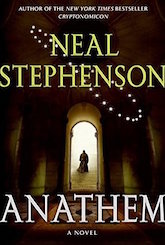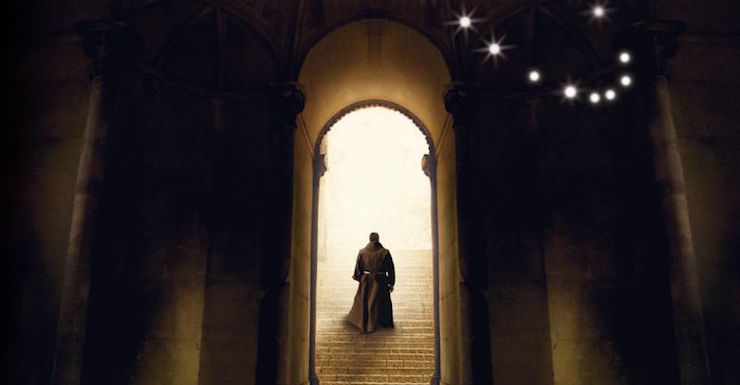Anathem, by Neal Stephenson, is one of my favorite books of all time—a thousand-page journey to another world that feels just a step removed from ours. It achieves this “existence-next-door” effect in a hundred different ways, but one of the most significant and pervasive is the book’s vocabulary, the very language Stephenson uses to tell his story.
The tale is set in a society that has apparently moved on in some way, very much like an Earth that has traveled along a trajectory where engineers and scientists come to be viewed at an increasingly distant remove from non-technical types. Knowledge of even basic scientific principles is relegated solely to a specific class of citizens with the desire to understand such things. The scientists become something like monks, called “Avout” in the book. They live in segregated communities called “Concents” organized in smaller communities called “Maths” based on seniority. These Concents are only opened to the public once per year, during a ritual known as “Apert.” Their version of monkish kung fu is taught in a place called the Vale, and is therefore called “Vale-Lore.”
Buy the Book


Anathem
Are you starting to see how it works? The Concents are both convents (of a sort), and concentric circles, rings of increasingly senior Avout—people very devout in their avocations. Apert: aperture, an opening. Vale-Lore: valor. The novel is full of this sort of thing. Even its title, “Anathem,” refers to a rarely-sung mass of expulsion when an Avout really screws something up. An anthem of anathema. As the story continues, we become more fluent in this vocabulary, understanding the reasons this world, called Arbre, is organized the way it is. Our own path of initiation into the mysteries of Anathem follows that of the main character, a young Avout named Fraa Erasmus, as he also slowly figures out the bigger picture of his existence and delves deeper into the various Concents.
It all feels juuuust familiar enough that we’re never completely lost, but it also feels very other, very different, very fresh. That alone is an incredible feat of writerly engineering. It’s hard enough to come up with one cool name for something, much less a hundred or so, each feeling appropriate and right. But then, the really, truly awesome thing—Stephenson pulls yet another card out of his deck, and reveals that Arbre feels similar to Earth because it almost is Earth. It’s a parallel dimension where the language evolved slightly differently—but that doesn’t mean our Earth isn’t part of the story too. We discover this when a minor character in the story is revealed to have been an alien interloper all along… an alien from our world, Earth, called “Laterre” in the book because the alien also happens to be French. Our own history on our own world exists within the world of Anathem—you and I are part of the story— it’s just mostly left off-stage.
The reveal lands so completely and well you can almost feel Neal Stephenson standing over your shoulder grinning with glee as you read it. It makes everything in the book make a new kind of sense, and also elevates it to an entirely new place.
It is, without a doubt, awesome, and as a writer myself, it’s the kind of thing that left me awestruck. May I build something half as cool in one of my own stories one day.
 Charles Soule is a musician, attorney and the New York Times bestselling author of numerous comics titles for Marvel, DC, Image and other publishers, with over 2.2 million individual comics sold in 2017 alone. He is best known for writing Daredevil, She-Hulk, Death of Wolverine, and various Star Wars comics from Marvel Comics, as well as his creator-owned series Curse Words from Image Comics and the award-winning political sci-fi epic Letter 44 from Oni Press. His novel The Oracle Year is now available from Harper Perennial.
Charles Soule is a musician, attorney and the New York Times bestselling author of numerous comics titles for Marvel, DC, Image and other publishers, with over 2.2 million individual comics sold in 2017 alone. He is best known for writing Daredevil, She-Hulk, Death of Wolverine, and various Star Wars comics from Marvel Comics, as well as his creator-owned series Curse Words from Image Comics and the award-winning political sci-fi epic Letter 44 from Oni Press. His novel The Oracle Year is now available from Harper Perennial.










